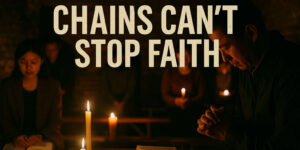This Christian Denomination Insists All Whites Are Racists
A Church of Christ blogger is making some harsh accusations against her Caucasian brothers and sisters—and indeed all whites.
Marchaé Grair, an admitted Netflix addict, puppy enthusiast, songbird, millennial dreamer, God-lover, editor of New Sacred and social media associate for the United Church of Christ, is calling on Caucasians to reject their white privilege.
“White privilege. It’s the phrase bigots hate to hear and progressives love to denounce,” Grair says. “If you are white and clicked on this blog to be congratulated for naming your privilege, you can stop reading in a few characters. Thank you for naming your privilege.”
As she sees it, it’s a good starting point of solidarity with people of color (POC) to name that your privilege exists. But she insists, naming your privilege is not the same thing as taking actions to reject it and dismantle white supremacy.
“White allies are quick to remind others that social change couldn’t happen without them, while not focusing much time on rejecting the oppressive systems and behaviors that necessitated the social change in the first place,” she says. “Talking about privilege while not doing anything to dismantle white supremacy is like seeing a fire and never calling 911. It just doesn’t do much.”
She goes on to say many white allies focus on calling out overt racism while not focusing on the more subtle ways they may perpetuate the racism they condemn. Then she calls on her anti-racism allies to spend one day challenging themselves to confront the ways they may also be racist:
Here are 10 ways you can actively reject your white privilege.
-
Take up minimal space during anti-racism dialogues and protests. Protests and anti-racism discussions should always center on the oppression experienced by people of color. If you are an ally who always has the microphone or the bullhorn, you’re taking up too much space.
-
Stop contributing to gentrification and calling it “urban development.” Many white allies feel too comfortable talking about white privilege without pushing for their residential communities to legislate against gentrification, which is like reverse white flight at the expense of a mass POC eviction notice. Are you living in a redlining district without calling out the displacement of people of color? Are you content with advocating for POC as long as you don’t have to live in their neighborhood?
-
Listen when people call you on your microaggressions. Your intent to be anti-racist doesn’t necessarily mean you automatically fit the bill. If people call you on microaggressions, don’t argue—listen. If you knew a word or phrase was offensive, you probably wouldn’t have said it. Being an ally doesn’t mean you’re above being educated on racism.
-
Never invite POC to the table for the sake of claiming diversity. “Diversity” is now a buzzword and “diversity work” is a very profitable industry. Don’t invite POC to your events so you can say they personify diversity or to hit an organizational quota. Engage with diverse communities because you plan on being intentional about hearing our stories and letting us come to the table authentically.
-
Refrain from using your POC friends as your “urban dictionary.” If you are engaging in discussions about race, you won’t always understand cultural references. Your POC friends or colleagues are not your “urban dictionary.” (And yes, I’ve heard people ask me if they should look up words I’ve used in the urban dictionary.) You may have to do some research to participate in anti-racism work, and that’s OK. Just think; POC spend their entire lives learning about culture from a white supremacist perspective. A few minutes on Google won’t hurt you.
-
Stop lifting up non-confrontational POC as examples for what POC activism should be. Martin Luther King Jr. was a great man—but he wrote more than his “I Have a Dream” speech. Few white folks quote his “Letter from a Birmingham Jail” to talk about King’s Legacy: “I have almost reached the regrettable conclusion that the Negro’s great stumbling block in his stride toward freedom is not the White Citizen’s Counciler or the Ku Klux Klanner, but the white moderate, who is more devoted to ‘order’ than to justice … .”
History through a white lens immortalizes the “safe,” diluted parts of liberation in hopes of POC seeking future liberation in similar ways. This framework centers the comfort of white folks and disregards the complexity of processing and rebelling against oppression. Here’s the thing—experiencing racism is a lot more uncomfortable than experiencing a radical response to it. If you’re uncomfortable with expressions of emotional pain by the oppressed, you may want to work harder at dismantling their oppression.
-
Call your friends, family and co-workers out on racism—even if a POC isn’t in the room. I’ve had plenty of friends tell me stories about times their family members, friends or colleagues said something racist. I usually wonder why they are telling me when most of their stories don’t end with them confronting the racism they encountered. How do you confront racism when the spotlight isn’t on you? Does it take a protest or a speech for you to call out racism? Can you address the racism of the people you love most?
-
Understand that all anti-racism work doesn’t look the same and advocate accordingly. Sometimes anti-racism work is about Black folks. Sometimes anti-racism work is about the entire African Diaspora. Sometimes anti-racism work is about Asian American folks. Sometimes anti-racism work is about Southeast Asian immigrants. “People of color” is an umbrella term that doesn’t address the complexities of the many people who experience racism. Understand that POC don’t go to bed in one-size-fits-all pajamas; our struggles and our liberations require nuanced thinking and action.
-
Realize that all discussions about race aren’t for you. And be OK with it. Should black people say [racial expletives] to each other? Should Beyoncé express her pain by calling someone Becky? Some conversations aren’t for white folks. They are intraracial critiques that don’t require an ally’s opinion. An anti-racist ally is like a guest at a family dinner. You’re invited to the table, but you should know what conversations require your abstention.
-
Recognize that you’re still racist. No matter what. Sometimes, anti-racist allies talk in an “us vs. them” framework when they discuss race, with the “us” being POC and anti-racist allies and the “them” being racist people. That’s an oversimplification of centuries of racism, and it also avoids one simple truth. White people always benefit from institutionalized racism, no matter how anti-racist your ideologies may be. You can’t disconnect yourself completely from the racism from which you benefit, and recognizing that is a large step in rejecting white privilege.






































